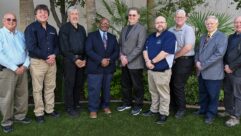The FCC has issued a ruling in a dispute over a construction permit to move a FM translator in Boston’s historic Beacon Hill area.
The WGBH Education Foundation, licensee of non-commercial WGBH(FM) in Boston, in June of 2020, filed a modification application to move the existing WGBH translator (W242AA) to a new site immediately adjacent to its licensed site in the city. WGBH also proposed a non-adjacent channel change from Channel 242 to Channel 247, and explained the swap would eliminate contour overlap with first-adjacent channel full-service WSRS(FM), licensed to Worcester, Mass.
It was the request to move the WGBH FM translator channel that would begin a domino effect and bring on a flurry of FCC filings by several other radio groups.
To start the FCC’s Media Bureau granted the WGBH modification request on June 24, 2020. The next day Beanpot License Corp., which owns WXRV(FM) at 92.5 MHz in Andover Mass., filed a request with the FCC to modify the facilities of its FM translator station Channel W243DC in Needham, Mass., to take advantage of the vacated WGBH channel on Chanel 242.
Then WJFD-FM Inc., licensee of full-service WJFD(FM) in New Bedford, Mass., in July 2020, filed a petition for reconsideration of the WGBH translator modification CP on the basis it would cause predicted interference to WJFD at 97.3 MHz.
[See Our Business and Law Page]
WGBH subsequently submitted a cancellation letter a month later to the Media Bureau stating it intended to stay put in its existing location and continue operating its translator on Chanel 242. Beanpot then objected to WGBH’s cancellation letter.
Beanpot in its argument supporting its objection to the of the WGBH translator modification cancellation cited several previous bureau decisions to support its claim that “once the FCC grants a translator modification application, the applicant must carry out the approved channel change and has at best an implied STA to continue operating on its original frequency while it constructs the new facility,” according to the Beanpot filing.
The back and forth between the parties continued with WGBH writing in its reply to the FCC “it has chosen not to change channels because information provided by WJFD has demonstrated to WGBH that it would not be practical for [the translator] to be built out on Channel 247.”
However, Beanpot continued to press the FCC to force WGBH to complete work on its new translator within the terms of its construction permit. “Beanpot disputes the validity of the predicted interference showing submitted by the WJFD application,” the broadcaster wrote.
Beanpot, which bills its WXRV(FM) as “Boston’s Independent Radio,” further argued that WGBH failed to formally serve the broadcaster with its CP cancellation letter in a timely fashion.
WGBH in Nov. 2020 attempted to resurrect its FM translator CP and move to the new site but to remain on the existing Channel 242 and at a lower power (3 watts ERP). In its second modification application, WGBH insisted its proposed transmitter facilities would not cause any prohibited contour overlap with the licensed Beanpot translator.
The NPR affiliate stated: “[The] proposed WGBH translator facilities would comply with respect to the first adjacent channel facility authorized in the Beanpot Modification Application because the area of existing overlap between the proposed WGBH Translator and the proposed Beanpot Translator would not increase as compared to the existing overlap between the licensed WGBH Translator and the proposed Beanpot Translator (in fact, would slightly decrease).”
Beanpot within a day filed an informal objection to WGBH’s second modification application.
Albert Shuldiner, chief of the FCC’s Audio Division, in a letter last week rejected Beanpot’s objections to WGBH’s cancellation letter and WGHB’s second modification application. The finding granted WGBH’s second modification application and appears to give the green light to WGBH to complete its FM translator move to the new facility site and remain on Channel 242.
It’s not clear from the FCC filings whether Beanpot License Corp. will proceed with its proposed modification request to switch FM translator channels.
Comment on this or any article. Write to [email protected].









